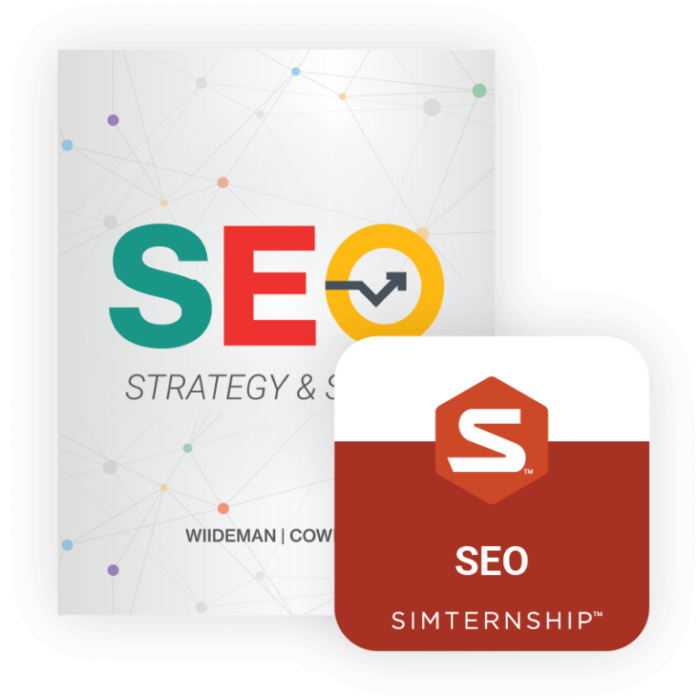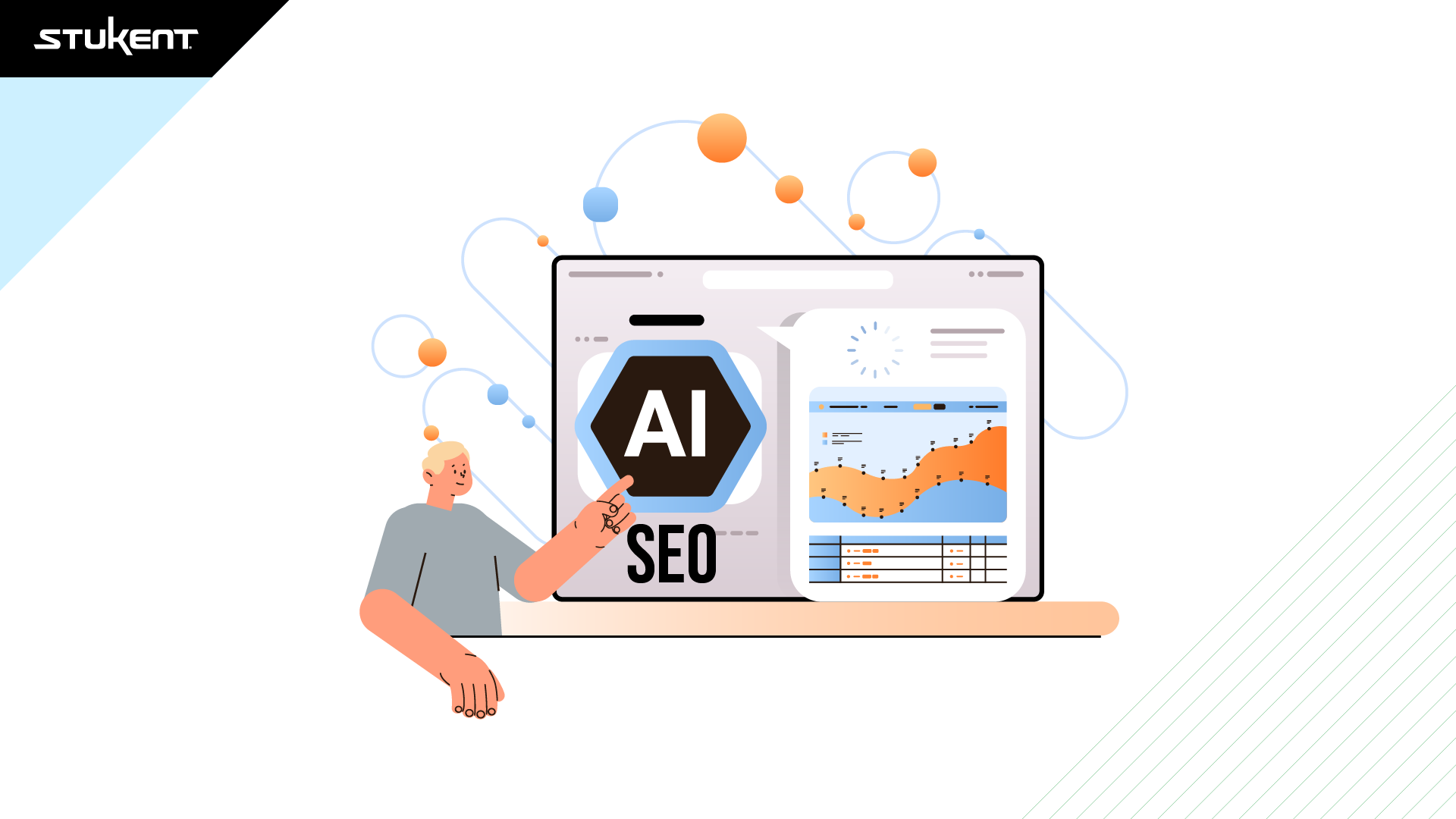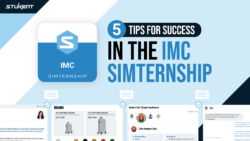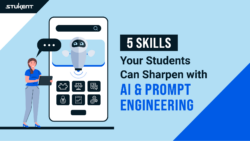Artificial intelligence (AI) is not just altering the techniques of search engine optimization (SEO), it’s also reshaping the skills students need to jump into future careers as marketing and SEO specialists.
So, how are SEO specialists using AI in their daily tasks? What are some of the challenges and advantages AI poses? We asked industry professionals to share how they leverage AI tools like ChatGPT to enhance their strategies and workflows. They offered practical insights into how you and your students can apply AI, from writing meta descriptions to researching competitors.
Content Creation and Strategy
In a sea of content generated by AI, you need authenticity to make your content stand out. There are several consequences you might face if you are overly dependent on AI. For example, Google’s search algorithms rank based on the quality and relevance of your content. If your content lacks originality or authenticity, it will likely be ranked lower in search results.
“As an SEO specialist and content writer, I am very careful about how I use AI in content creation,” said Beth Gillem, SEO specialist at Dogwood Media Solutions. “AI acts much like a search engine, gathering content from other content on the web. If we are not careful in how we use it, our content will offer nothing special, authentic, or new to our visitors. It will simply be rehashed content that’s already been published.”
Beth and many other specialists use AI to organize ideas and initiate creativity. When using AI to create content, it is important to edit for your brand’s voice and your audience’s needs.
“We must remember that we write for people first and search engines second, and we always want to add value for our visitors,” Beth explained. “If the content we publish is nothing but a rehash of what has already been published, are we really adding value? Are we best demonstrating our expertise in that field? Do we have the best chance of ranking for our desired keywords? I don’t think so. AI is not a bad tool, but it must be used wisely. Revising and personalizing content cannot be overstated when implementing AI in your strategy.”
Katie Stone, an SEO lead at Leadhub, says that she plans to use AI primarily as a sounding board for coming up with content strategies and topic clusters in 2024.
“I use it to help me narrow down siloed content ideas for my clients’ niches so that the content will be hyper-relevant to their services, sending more positive signals to search engines that we’re subject matter experts,” Katie said. “This falls in line with Google’s updated E-E-A-T guidelines and helps our clients share helpful content. When we post siloed-out topic clusters, we’re able to strengthen the internal linking web and communicate to users and search engines alike that the content is all relevant to the niche.”
To do this, Katie shares her buyer persona and her client’s persona with ChatGPT and prompts it to brainstorm topics that relate to one another in the niche. This helps her structure content in a way that follows the buyer’s journey and speaks to her expertise on the subject.
Summarizing Lengthy Content
AI can also help with rephrasing and summarizing your content. Ashley Romer, an SEO manager for PaperStreet Web Design, says that AI helps her summarize lengthy editorial pieces.
“I use ChatGPT mainly to save time with writing,” Ashley said. “If I need to write a summary of a longer piece, it is much faster to have ChatGPT summarize it for me than to do it myself. I can then rephrase anything that sounds odd or add more details to the parts I want to emphasize.”
Trevor Stolber, the agency owner of STOLBER Digital, said that he uses ChatGPT API to write meta descriptions for web pages. He emphasizes the importance of including context in your ChatGPT requests. The more information, the better.
Trevor said, “I give it the URL, title, H1 heading, and any H2 headings, and use XPath to grab the first content section. Then, I package that up into one prompt to get an optimized meta description.”
“Using AI in SEO is risky,” he continued. “There are some good use cases. The one I am discussing here is a low-risk item that helps tidy up audit findings on large sites, where it’s not practical for a person to write thousands of meta descriptions. Rather than giving ChatGPT the URL and saying, ‘Make up a meta description,’ I am giving it the full context of the page so it is highly relevant to the page the description is for. This isn’t an earth-shattering, 10X-your-traffic hack, but it’s a handy little tidy-up function that has made dealing with large sites a little easier.”
Keyword Research and Data Analysis
AI can be a game changer for professionals or students who are analyzing large data sets or researching keywords.
Giovanni Della Ventura, a copywriter and SEO consultant for various blogs, explained how he uses ChatGPT for keyword research: “I usually ask ChatGPT to ‘give me 30-50 semantically-related keywords and entities related to my main keyword’ (soccer, for example). Then, I paste this huge list into an SEO tool (it can be Ahrefs, Semrush, SE Ranking, etc.), and it will give me a list of search terms that include certain keywords. After that, I take this list and ask ChatGPT to ‘classify the intent (informational and transactional) of these keywords and put them in an organized table.’ This allows me not only to have a list of related keywords and increase my topical authority but also to understand the search intent, which is one of the most important factors for ranking on Google.”
Some specialists also use AI to identify audiences and classify keywords by search intent. Zoltan Fagyal, an SEO consultant and founder of Back Bay Digital, said that he uses Perplexity.ai and ChatGPT to identify audiences when outlining an article.
“I still visit the resources and browse through them,” Zoltan added. “This is a great way to speed up the research process and, in many cases, to find answers only possible after time-consuming research.”
Ben Poulton, the founder of Intellar SEO Consultancy, shared that he gets the most out of AI tools through processing data. He said that if you feed ChatGPT a dataset, even a screenshot from a report, it can analyze it all for you and write a quick summary.
“That alone is an incredible time-saver,” Ben said. “Another great method is to feed ChatGPT lists of keywords and ask it to categorize them for you — again, a major time-saver. That’s what I use AI for: to save me time. To do the tasks that would otherwise take me hours, which makes it such a powerful tool when used correctly!”
Competitor Analysis
In the past, most companies have done manual data collection or research for competitor analysis. This can be time-consuming as it involves scouring competitors’ websites for keyword usage, rankings, and content strategies. By using AI, professionals can save time during this process.
Alan Muther, the founder of Ardoz Digital, shared that his company uses ChatGPT to summarize their competitors’ content for gap analysis.
“I think it’s really important to know what your competitors are talking about so you can find opportunities to make your own pages better,” Alan said. “But going through a lot of posts takes a lot of time and effort. What I do is give ChatGPT a few URLs from competitors. It gives me a neat summary that shows their topics, keywords, how they use pictures and videos, and the links they include.”
By doing this, Alan can quickly spot where his content doesn’t measure up.
“I can easily find things like keywords they’re using that I’m not, recent facts they’re mentioning, different kinds of information like charts or videos, and links they use a lot,” Alan added. “With this knowledge, I can create content that fills these gaps and is effective for achieving higher rankings without having to start from scratch.”
Alan notes that users should always treat these summaries as a starting point and check the details on the competitors’ websites when they need to.
Enhance Your SEO Course
For educators, these insights from industry professionals offer a valuable resource for shaping a practical SEO curriculum that prepares students for the dynamic intersection of AI and digital marketing. At Stukent®, we know one of the biggest hurdles in teaching SEO is the time it takes to stay up to date.
Stukent’s SEO Bundle bridges the gap between the classroom and the job market, allowing your students to see the results from their work in five minutes rather than five months. In the “SEO: Strategy & Skills” courseware, your students will learn on-page and off-page SEO, keyword research, link building, and other critical skills.
In the Stukent SEO Simternship™, students take on the role of an SEO specialist at Buhi Supply Co., a simulated e-commerce retailer, where they optimize on-site and off-site SEO, complete site audits, perform keyword research, analyze SEO strategy, and interpret key metrics.

To learn about Stukent’s first-in-the-world Simternships and courseware and to get FREE instructor access to Stukent materials, visit our website.






